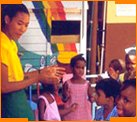 |
THEMES
|
 |
 |
Pays
|
 |
 
|

|

|

 Afrique
»
Education
»
ACCUEIL
Afrique
»
Education
»
ACCUEIL

|

Early childhood education in Africa
Early childhood care and education (ECCE) remains a luxury for most African children. Although the pre-primary gross enrolment ratio has generally improved since the beginning of the 1990s, the majority of African countries have very low pre-primary enrolment of less than 10 per cent. However, gross enrolment levels vary greatly in the region, from 90 per cent in Mauritius to less than 1 per cent in Democratic Republic of Congo and Djibouti.
In most African countries early childhood care and education is often provided by private institutions and is concentrated in urban and wealthy areas, where parents can afford the costs and tend to be more aware of its benefits. As a result, girls’ access to ECCE is much better than to other levels of education. In some countries (Burkina Faso, Cape Verde, Comoros, Congo, Guinea-Bissau, Lesotho, Mauritius, Namibia and Zimbabwe) more girls are enrolled than boys.
Africa faces many obstacles in its efforts to improve early childhood education, such as a lack of resources, inequitable access to services, the absence or insufficiency of mechanisms to ensure quality in training and provision, and the low status of early childhood education personnel. Poverty, conflicts and prevalence of HIV/AIDS make the region particularly vulnerable and obstruct the building of a sustainable, quality early childhood provision. However, African governments are increasingly attempting to mobilize private, voluntary and community-based partners to promote and strengthen early childhood education.
|
To know more
 
|
|
|
|
